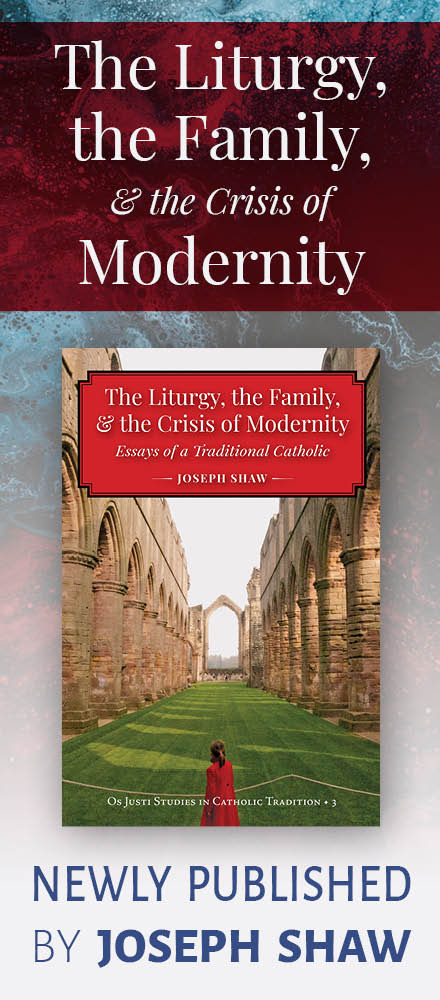When will the tide turn on bad music at Mass? After years of suffering and pondering this critical question--and I know many people who are so despairing that they see no way out--I am beginning to wonder if we really are in the midst of a international revolt of some sort. Hardly a day goes by when I don't see another public decrying of the state of music in the Catholic Church and a call for a progressive restoration of what we have lost.
Here is another example:
The Scotsman
Composer damns happy-clappy din
TRENDY guitar-strumming folk groups are ruining church services by playing "embarrassing, maudlin and sentimental dirges", Scotland's leading classical composer has declared.
James MacMillan, who wrote the fanfare for the opening of the Scottish Parliament in 1999, has described modern hymns as "excrescences" and called for a return to traditional chants and organ music.
A devout Catholic, MacMillan uses an article in a religious magazine this weekend to confess his despair of the "screaming microphones" and "incompetently strummed guitars and cringe-making, smiley, cheesy foil groups" which fill churches every Sunday.
He reserves particular venom for two well-known modern hymns, 'Bind Us Together, Lord' and 'Make Me a Channel Of Your Peace', the latter having even been recorded to popular acclaim by Irish singer Daniel O'Donnell.
MacMillan says the hymns amount to "cultural vandalism" and that a backlash against such groups is growing, with more church-goers demanding a return to the traditional music which filled churches before reforms of the 1960s.
He declared: "The church has simply aped the secular West's obsession with 'accessibility', 'inclusiveness', 'democracy' and 'anti-elitism'. The effect of this on liturgy has been a triumph of bad taste and banality and an apparent vacating of the sacred spaces of any palpable sense of the presence of God."
The Glasgow-based composer is one of the country's most celebrated musicians, whose work has long drawn heavily on his own strong religious faith.
He is no stranger to controversy, having most famously launched an attack on anti-Catholic sectarianism, describing it at Scotland's "secret shame".
MacMillan said he was not advocating a ban on all modern hymns, but argued that all church music should be "skilful" and "rooted" in tradition. "What you get more and more is a kind of egotistical band who strum guitars and don't try and engage the rest of the congregation," he said.
The 1960s and 70s, he said, brought a "destructive iconoclasm" into the church "which wilfully brought to an end any remnant of its massive choral tradition and its skilful application to liturgical use. Like most ideas shaped by 1960s Marxist sociology, it has proved an utter failure."
MacMillan's provocative comments drew a mixed response from church figures last night, with many musical leaders arguing that amateur folk groups who played every week should not be mocked for their efforts.
However, others said MacMillan was right to highlight the trend away from choral music. His outburst follows a call by Pope Benedict to ensure that all modern hymns were properly placed in the tradition of the past. The Pope said recently: "An authentic updating of sacred music cannot take place except in the wake of the great tradition of the past, of Gregorian chant and sacred polyphony."
MacMillan said he agreed with the Pope. In his article, which appears in the Catholic magazine Open House this weekend, he declared: "The Pope is presented as a stern-faced, party pooping disciplinarian, stamping out electric guitars, pop-crooning and the sentimental bubble-gum 'folk' used in many of today's Catholic churches. The people attacking him are the very ones who were responsible for the banal excrescences enforced on us in the name of 'democratisation of the liturgy' and 'active participation' over the last few decades."
The Reverend Charles Robertson, the former convener of the committee for the Church Hymnery, said he too personally had little time for many modern hymns. But he said this was not a reason to scrub them from the Kirk's Hymnal.
"Some people are moved by 'Bind us Together'. I don't like it at all but I know many, many people for whom some kind of blessing is given when they sing it and who am I to complain about that?"
Robertson highlighted one hymn for particular criticism. "The chorus is 'Jesus is wonderful isn't he, isn't he? Jesus is wonderful isn't he, isn't he?' And yet there was another minister who said that this his favourite hymn."
Monsignor Gerry Fitzpatrick of the Roman Catholic Glasgow Archdiocese said: "I don't think you can make such a bald statement. There has been some very good music written for the church in recent years. Of course, everything has to be done well but we also have a serious obligation to ensure active participation and people should not be mocked because they have made errors of judgment when their intentions are good."
Former SNP MSP Mike Russell, who has previously come to the defence of the classical hymn 'Jerusalem' after the Kirk removed it from its Hymnal, said: "I think he is more than half right.
"There are some good musical tunes but by and large the desire to escape tradition has weakened quality and we should be looking at the quality and spiritual quality of the music and to that extent he has a point."




















